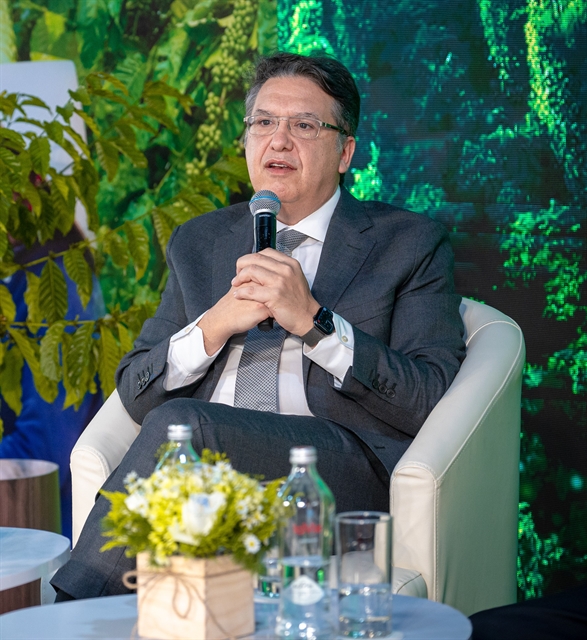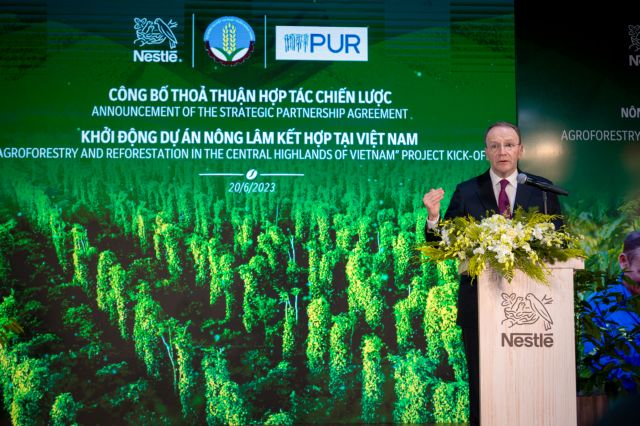 Economy
Economy

Nestlé Vietnam is one of the biggest food and beverage companies in the country, with currently around 3,000 employees and six factories. Việt Nam is one of Nestlé’s key suppliers of coffee, and the company has been working closely with local farmers to produce high quality coffee, while its factories have been manufacture high quality food and drink products for domestic consumption and exports.
Việt Nam News spoke to Remy Ejel - CEO of Zone Asia, Oceania and Africa - and Mark Schneider - CEO of Nestlé, on Việt Nam’s potential for Nestlé, and the company’s investment in the country.

|
| Remy Ejel - CEO of Nestlé's Zone Asia, Oceania and Africa, speaks at a press conference in Đồng Nai Province about the company's commitment to Việt Nam. Photo courtesy of Nestlé |
Can you share with us why Nestlé chose Việt Nam as a key manufacturing hub to produce and export products to other markets?
Remy: We are very proud to have been part of the journey of Việt Nam for many decades, with many strong local brands such as Milo and Nescafé. The coffee itself is really a local innovation, which we are even exporting to other markets.
The purpose of Nestlé has always been to provide food and beverages that are nutritious to different social, economic classes. That’s our aim, and so export and the development of sustainable generative agriculture are very important to us.
The geographical location of Việt Nam, the different initiatives that have been done by local authorities (especially regarding sustainability), and the work to develop the local community have put us in a great position.
They help us not only to grow in Việt Nam with our consumers, but also be a part of the great economic journey of Việt Nam, of which export plays a very important role.
Can you elaborate more on Nestlé’s business commitment to Việt Nam?
Mark: We want to be a long-term player in this market. It would be easy for us to just buy the coffee here and process it somewhere else. And yet we are here, investing in facilities in Việt Nam over many years and providing high quality jobs and training.
We don’t just want to be a multinational company that does business transactions with countries, we want to be a good corporate citizen that is deeply embedded in Việt Nam, and become part of the local society, a good neighbour. We want to be someone that the people in Việt Nam can rely on for jobs and contribution to economic growth.
How have the recent global economic challenges affected Nestlé's plan to expand its production in Việt Nam?
Remy: We believe we are part of Việt Nam’s ecosystem, and like Mark said, we aim to be a good corporate citizen to Việt Nam.
To be a part of the ecosystem, it means that when there is a little bit more challenges, we remain committed to the farmers, different stakeholders, and the community in which we operate. We take a lot of pride in doing that. When we were hit by COVID, there is no doubt that our team in Việt Nam and the country have shown great resilience.
In terms of investment, we have committed to invest a further 130 million Swiss francs ($145.6 million) in 2021, and this is something that we are implementing. This is because we believe in the long term strategic importance of our relationship, and the importance of Việt Nam as a market.
We believe in the opportunity that is there. And we will continue to work with different stakeholders so that we can deliver the concept of creating shared value, which is extremely important to us.

|
| Nestle believes that the positive economic development of Việt Nam will continue, said Mark Schneider, CEO of Nestlé. Photo courtesy of Nestlé |
What do you think of the potential of Việt Nam’s market in the coming years?
Remy: We have been here for many decades, and we have very strong brands that are part of the daily nutrition of many Vietnamese. We see an important opportunity to drive our nutrition agenda by providing food and beverages, with the strong heritage that has been built over the years.
We see Việt Nam as a lighthouse when it comes to sustainability, but there is also the aspects of digitalisation and the evolving consumers, which are related to economic development and stability.
The fact that everyone here is talking so much about nutrition and growth is very important to us. For example, many mothers now have more knowledge and expectation to provide the best nutrition for their children to grow healthily.
Mark: We have a lot of faith that the good economic development of Việt Nam will continue. And with that, people in Việt Nam will have higher income, and higher demand for good quality food and beverage products.
A digital society is also very educated and well-informed; people can easily look up what food is good for their health.
We are committed to high quality food and beverage, so this is to our advantage because people can see all the benefits that our various food and beverage products can bring to them. There are so many areas where we can benefit all of you, as society continues to grow and prosper.




